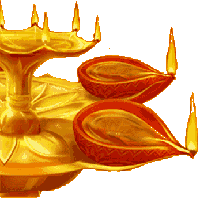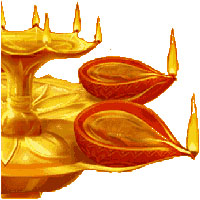Diwali Celebration
 Greetings, on the occasion of Diwali, the most popular and widely celebrated festival in the Hindu world. We are grateful, once again, for the historic opportunity to celebrate Diwali in the White House with friends’ and family, and we express our gratitude to President George W. Bush and his administration for this joyful honor. Our heartiest congratulations and best wishes to our President on his resounding re-election. We look forward to an era of peace and prosperity under his strong leadership.
Greetings, on the occasion of Diwali, the most popular and widely celebrated festival in the Hindu world. We are grateful, once again, for the historic opportunity to celebrate Diwali in the White House with friends’ and family, and we express our gratitude to President George W. Bush and his administration for this joyful honor. Our heartiest congratulations and best wishes to our President on his resounding re-election. We look forward to an era of peace and prosperity under his strong leadership.
Diwali, the Hindu festival of light, beautifully mirrors the unity In diversity that is characteristic of the Hindu tradition and that is expressed also in the motto from the Great Seal of the United States:
E Pluribus Unum ~ “From Many, One.” While the stories and traditions associated with Diwali are many, the one central symbol of the festival is Light, representing God5 goodness, wisdom happiness. Across religions and cultures, light is identified with life, hope and faith persisting In the midst of despair and evil.
Diwali is celebrated In the Hindu month of Kartika, which corresponds to October-November in the Western calendar. Although Diwali is a festival In Its own right, it is also the climax and culmination of a season of Hindu festivals that begins during the preceding month of Ashvina (September-October). This is the month of Navaratri, the festival of Nine Nights, when the One God is worshipped as Divine Mother in the forms of Durga, Lakshml and Saraswatl. Following this, Hindus celebrate Dasara or Vijayadashami, the festival of victory, commemorating the triumph of goodness over evil and fear. At the end comes Diwali, the festival of lights and Illumination.
The sequence of this season of festivals provides us with a meaningful way of reflecting, this year, about the significance of Diwali. Navaratri, which starts the season, offers us a special time to honor God as mother. Although God transcends all gender categories, God can be imagined equally as father or as mother. Navaratri begins with the worship of God as Durga, who Is associated with the power and energy of the divine in creation and in the triumph over evil. Her, grace is sought for the strengthening of our wills, for self-determination in our lives and for overcoming evil, both within ourselves and in the world. Powerlessness makes us- susceptible to the domination of evil. The freedom to determine one’s destiny is an important ingredient for a meaningful human life, but the ultimate source of our power and Independence is God.
The worship of the divine as Lakshmi follows the worship of Durga. If Durga represents the power of the divine and our own need for self-determination, Lakshmi is associated with divine abundance and prosperity. The Hindu tradition is not indifferent to the significance of wealth and prosperity for our well-being and as a requirement for our growth and development. In the absence of wealth, justly acquired and distributed, power is tenuous and uncertain and we are likely to become subject to the authoritarian rule of others. Poverty is a form of powerlessness and power is meaningless without economic self-determination.
The nine nights of Navaratri culminate with the worship of God as Saraswati. If Durga represents divine power and Lakshmi, divine abundance, Saraswati represents divine wisdom, the knowledge through which God creates and sustains. In the Hindu worldview, knowledge is valued above all else. The reason is because knowledge has the practical task of finding a solution to the problem of human suffering. It is motivated by a compassionate concern for overcoming human misery.
The worship of God as Saraswati reminds us that the pursuit of power and wealth, as ends, is dangerous. These must be understood as means to the nobler and higher end of liberating human beings from suffering. The fruits – of knowledge must be applied compassionately for the alleviation of human misery. The highest knowledge is that which enables us to see God in all and which awakens compassion in our hearts.
Navaratri, the festival of nine nights, underlines the necessity for a proper balance, in our individual lives and in the life of our nation, among the necessary goals of power, economic prosperity and wisdom. If power and wealth must be inspired by compassion, knowledge must not be disconnected from the real-life concerns of human beings for self-determination and freedom from poverty.
In this balance is to be found true victory (Vijayadashami) and the key to individual and national well-being. This balance brings illumination and light (Diwali) to our lives and we can celebrate and rejoice by lighting up our homes, villages, and cities. We can embrace each other in love, exchange gifts and share meals. We can join in the famous prayer of the Vedas for world peace.
Aum dyau Shanti/
Antariksham Shanti
Prfhivi Shanti/Apah Shanti
Oshadhayah Shanti/Vanaspatayah Shanti
Visvedevah Shanti/
Brahma Shanti
Sarvam Shanti/
Shantireva Shanti
Sama Shantiredhi/
Aum Shanti Shanti Shanti
May there be peace in the
skies and on earth
May there be peace in the
waters and in the forests
May there be peace everywhere,
And may that peace,
true peace, be ours
On this auspicious occasion of Diwali, our prayers are with the Hindu community and with our President and his family as he begins a new term in office. In confronting the many challenges of our time, may God bless him with the wisdom and strength to bring peace, security and prosperity to our nation, and to all humanity. May God’s guidance and protective presence be always with him and may God continue to bless our nation, the United States of America.



























